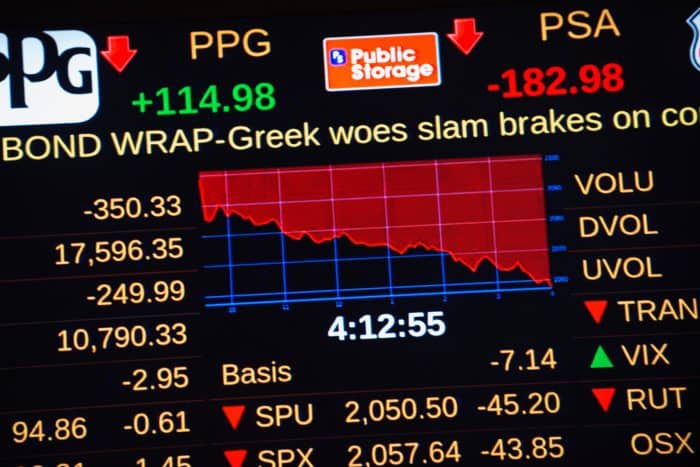Also read: What if there’s no deal on rescuing Greece by June 30 deadline?
WASHINGTON, D.C. — Greece appeared likely to default on its debt on Tuesday, sending financial policymakers in Europe and the United States scrambling to ensure that the turmoil in Athens does not escalate into a broader financial panic.
U.S. stocks faced their worst day of the year on Monday, with the Dow Jones industrial average plunging 350 points. It was part of a sell-off that spanned three continents after negotiations between Greece and its creditors broke down over the weekend and Athens closed the nation’s banks. The country is facing a required debt payment of 1.6 billion euros to the International Monetary Fund, but Greek officials said Monday there was no way they could come up with the money.
Meanwhile, Puerto Rico became the front of a new crisis, with Gov. Alejandro García Padilla saying in a televised address on Monday evening that the island could not pay back at least $73 billion in debt. García Padilla said he would seek a deal with lenders and urged Congress to pass an unprecedented law allowing the U.S. territory to file for bankruptcy — something the White House for the first time encouraged lawmakers to consider.
The prospect of twin defaults in Greece and Puerto Rico highlighted the fragilities that still threaten the global financial system. Though the initial fallout seemed contained on Monday, some analysts said the crisis reveals that economies are more vulnerable to shocks than they appear.
“These things don’t happen when global economies are accelerating,” said Steven Ricchiuto, chief economist at Mizuho Securities. “These things tend to boil over to the surface when global economies are underperforming.”
Greece has until 6 p.m. ET on Tuesday to make the IMF payment, and there is always a chance that an eleventh-hour deal could be struck. But, while analysts said Greece and Europe might ultimately come to an accord without much more financial damage, it seemed highly unlikely that would happen by the deadline.
U.S. President Barack Obama and Treasury Secretary Jack Lew lobbied European and Greek officials over the weekend and into Monday to urge them to find an agreement that keeps Greece on track to meet its obligations and preserve its place in the euro zone. White House press secretary Josh Earnest said on Monday that although the situation “does not pose a major direct risk ” to the U.S. banking system, it is important that the European economy stay strong.
“Robust growth and economic stability in Europe is clearly within the U.S. economic interest but also in our national security interest, as well,” he said.
Earnest also said the administration is not considering a federal bailout of Puerto Rico. But the White House is asking Congress to look at creating a mechanism for the island to declare bankruptcy, similar to one used by cities and other municipalities, officially known as Chapter 9 bankruptcy.
Economists say that regardless of what happens, Greece and Puerto Rico face a grim outlook. Greece is already back in recession, and residents of Puerto Rico are leaving the island in droves. Their economies are small — Greece’s is about the same size as Connecticut’s — but the global financial crisis in 2008 was a lesson in how relatively small pockets of instability can rock the entire world.
The debt crisis erupted as Europe was just starting to emerge from a double-dip recession. The 19 countries that have adopted the euro as their currency logged the strongest growth in two years during the first quarter. Particularly encouraging was the healthy showing in fragile countries such as France and Italy. Meanwhile, economists were predicting more rapid growth for the United States amid robust hiring and rapidly falling unemployment.
But the turmoil in Greece and Puerto Rico threatens to interrupt that progress. At the very least, it is a sign that the world economy remains exposed.

The clearest sign of that weakness came Monday in the form of a swift negative reaction from global financial markets. At its close Monday, the Standard & Poor’s 500-stock index was down 43.85 points, or 2.1 percent, to 2057.64. Earlier, Germany’s DAX dropped 3.6 percent.
The trouble began overnight in China, which has already been experiencing a stock market correction after a historic boom this year. The tech-heavy Shanghai Composite Index fell nearly 140 points, or 3.4 percent, to 4053. The market is now officially in bear territory.
Beyond that, there were no major disruptions. But the worst-case scenario is what analysts call “contagion.” A Greek default could force the country to leave the European Union and drop out of the 19-member euro zone. That could send investors into a frenzy, pulling money out of not only Greece but other fragile economies.
A rapid outflow of capital could in turn destabilize countries such as Spain and Italy. If that was to happen, a tidal wave of panic could wash over Europe and spill over into the United States. A flight to safety could push up the U.S. dollar, crimping exports and dampening the American recovery.
But European officials and many economists say that possibility is slim. Greece technically defaulted on its debt in 2012, leading to a massive restructuring of its payment program. Since then, vulnerable countries have shored up their economies and investors know what to expect, said Jacob Funk Kirkegaard, a senior fellow at the Peterson Institute for International Economics.
“Greece in some ways was the last war, and they’re well prepared to fight the last war,” he said.
As Greece neared darkness on Monday, creditors and its leaders were poised to keep talking about whether there was any way to pull back from the brink of economic collapse amid anger and recriminations on both sides.
Greece’s European partners and international lenders say further cutbacks are needed to maintain the financial lifeline that has kept the country afloat for years. Greece’s government — elected on its anti-austerity pledges — has stood firm in opposing politically sensitive measures such as further slashing pensions.
Greek Prime Minister Alexis Tsipras stunned the world over the weekend by announcing that he would hold a referendum this Sunday over whether his nation should accept the austerity terms of its creditors. He has been campaigning for a no vote and suggested Monday that Europe had boxed Greece into an impossible situation.
“Having asphyxiated banks & denied extension request,” he tweeted Monday, “is it reasonable to expect that IMF installment will be paid tomorrow?”
But many other Greeks believe it is better to accept the cutbacks demanded by Greece’s creditors and remain in the euro zone. A yes vote would effectively be a rejection of Tsipras and could set off new elections.
“We’re urging you to reject it with all our strength,” Tsipras told a late-night television interviewer on Monday, saying that the costs to other euro-zone countries were far too high to kick Greece off the currency. “The bigger the percentage of noes, the bigger the weapon of the Greek government to relaunch the negotiations.”
The gathering crisis in Greece will test the firewalls puts in place by European policymakers to prevent a broader financial meltdown. The country has shut down its banks and limited customer withdrawals to the equivalent of just $66 a day. Greek debt is not widely held, limiting global exposure. The country’s main creditors are the IMF, the European Central Bank and other euro-area countries.
In addition, central banks have developed new tools to stimulate weak economies and stabilize financial systems. ECB President Mario Draghi unleashed a massive stimulus program earlier this year and has vowed to do “whatever it takes” to maintain a single currency.
Greece amounts to just 1.8 percent of the euro-area economy, and the United States’ direct exposure to Athens is limited. Greece accounts for less than 1 percent of all U.S. trade, much of it in vegetables.
“What we’re seeing today — a decline in U.S. stocks, but one that in magnitude does not go beyond the kind of day-to-day movements we’ve seen all year — pretty accurately reflects the way the European Union) meetings went this past weekend: ending badly, but in a way that was not entirely unexpected,” Peter Ireland, an economics professor at Boston College, said in an email. “These events aren’t enough to derail the ongoing U.S. recovery.”
Birnbaum reported from Athens. Michael Fletcher and Jonnelle Marte in Washington contributed to this report.
© 2015, The Washington Post






